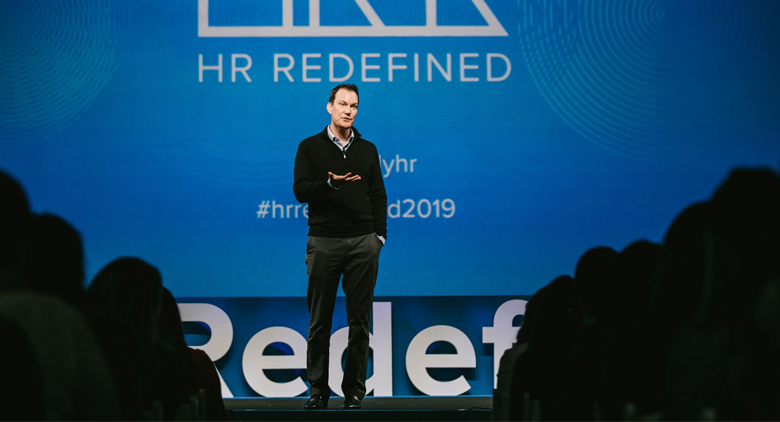
Want to Be Happier at Work? Try This.

We all want to be happy, but why does happiness seem to come more naturally to some people? Shawn Achor, New York Times best-selling author and HR Redefined 2019 keynote speaker, says there’s hope for even the most negative-minded pessimists to find happiness.
So what’s the secret? Achor says even small daily mindset changes can have a lasting impact on how we see the world.
To push past the negative news, social media comparisons, and wealth of information our brains are overwhelmed with every day, Achor says we all need to practice “happiness hygiene.” In just two minutes a day, Achor says you can boost your mood and contribute to long term happiness. Here’s what he had to say about finding joy and embracing positivity in your life:
You’re a best-selling author and one of the foremost experts on happiness. How did you discover your passion for the “field” of happiness?
I was at the Harvard Divinity School studying Christian and Buddhist ethics and how a person’s beliefs impact their happiness. Some people from the school’s psychology department were asking similar questions with a more scientific lens. They wanted to quantify if someone was becoming more compassionate, optimistic, or positive—something I hadn’t previously thought possible. They told me if we can measure depression, we should be able to measure happiness. I was immediately hooked. I’ve been working with companies and schools to figure out how to make our institutions better suited to promote happiness and positivity ever since.
How have you noticed the way we define happiness change over time?
I think that more and more people define happiness as pleasure which causes us to pursue happiness the wrong way. We pursue a dopamine rush that has a diminishing effect over time so we need more and more pleasure to have the same impact.
When I was researching happiness, I looked at how the ancient Greeks approached happiness. They defined it as “the joy you feel moving towards your potential.” Happiness is not a static idea or complacency because you can actually feel joy even when the world is not pleasurable. It’s an emotion that motivates change in that person’s life. It’s growth producing. As soon as you embrace that way of thinking, you get a completely different understanding of happiness.
We’re about to welcome a new generation to the workplace: Generation Z. HR has to take on the challenge of keeping them, “millennials,” Gen X, and baby boomers happy in the workplace. Are there differences in the way these generations perceive and define happiness?
I find that the younger generations are demanding greater levels of meaning and well-being at work, while older generations prefer talking about the value of doing good work and the effort that goes into it. I think that all generations learn from one another. We all do better work when we are positive and happy.
The younger generations want happiness, but they’re going about finding it in the wrong way. Happiness is not just something that is given to you by an organization. You have to co-create it as well. Organizations have to create the conditions for happiness, but individuals have to create or bring work routines, behaviors, and mindsets that embrace happiness. The more I get into positive psychology, the harder I have to work on my happiness. Happiness is not something you just choose, it’s something you have to create.
Human resources departments play a huge role in shaping the day-to-day employee experience. What can HR do to fostering a spirit of positivity in the office?
Happiness is fascinating to study because it’s not just an individual choice. The organizations and power structures in our world have an impact on how easy it is to choose happiness and optimism in our lives. My goal in this research is to both empower the individual to believe his or her behavior matters, at the same time I want to show a connection between levels of happiness and optimism and business performance and productivity. Once we find that connection, organizations can find an invested interest in creating workplace conditions in which positivity and happiness can flourish.
We find that the organizations that focus on wellbeing in their HR departments perform better, have higher levels of happiness and retention, and see their share prices rise. If you can make those connections between the individual and the organization, you have a system that’s easier to choose happiness and more people will make that choice.
We hear a lot about burnout these days and the World Health Organization recently classified it as a legitimate medical condition. Why do you think today’s employees are spreading themselves too thin?
Depression rates have doubled over the last decade. I think that indicates it’s not just hard to be human, it’s increasingly hard. Something has changed over the past ten years and I think it’s twofold. I think you’re constantly bombarded by information, we can fill every moment without any time to process or recover, which leads to burnout. We’re hype comparing with unrealistic expectations and when that occurs, regardless of what you’re doing, you feel exhausted. In the mix of that, we’re doing even more than ever before with our brains and feeling like we should do more. It’s a recipe for burnout.
Many studies reveal that taking time off from work can greatly increase employee happiness and reduce burnout. How can companies encourage employees to use their PTO?
Employees lose out by actually not going on a vacation. Leaving paid time off days on the table means you’re accepting a pay decrease. Not taking enough time off dramatically decreases your happiness and productivity. Employees who do take all of their vacation days have a 7 to 10 percent increased likelihood of getting a promotion. At the individual level, we need to consciously take every single one of our allotted days off. At the organizational level, we have to encourage employees to take all of their days off. If we really value our talent’s well-being, we can’t just give lip service to “you matter.” Given the fact that there’s such a positive correlation between taking days off and increased productivity, then I believe companies should incentivize that you take all your days off. If you’re not incentivizing people to take their days off you’re trying to get less out of your employees.
What are some things we can do in our everyday lives to make ourselves happier?
I recommend two small personal habit changes that can have a huge impact on your personal happiness. Happiness isn’t something you inherit, it is something you cultivate. Gratitude exercises can turn genetic pessimists into default optimists. Practicing these two habits helps you work on your “happiness hygiene” and when they become a part of your daily routine, like brushing your teeth. That’s how you start to view the world a little differently.
The first habit is to write down three things you are grateful for that happened in the last 24 hours and why they are important to you. After about 21 days, your brain begins to consciously look for those pinpricks of positivity throughout your day and that changes the way you see and interpret your life.
The second is to write a positive email praising or thanking a person in your life. You’d think you’d run out of close friends and family in a week or so, but then you realize all the other people that impact your life, like your kid’s soccer coach, your high school English teacher, etc. Once you start thanking people, your brain gets addicted to it. You spend the whole day thinking about how great you are for sending that email or text and it improves your relationship with that person.
At the end of the 21-day period, your “social connection score”, which is the breadth, depth, and meaning of your relationships with other people, would be in the top 10 percent of the world. This score is the greatest predictor of your longterm happiness, performance, and resilience. It’s as predictive of how long you will live as obesity, high blood pressure, or smoking. That means a two-minute email or text could impact your life as much as if you stopped smoking.
Is there anything else you want to share about your understanding of happiness?
There are three things that I want everyone to know about happiness:
1. Happiness can be a choice if you apply behavior habits.
2. Happiness is contagious.
3. Happiness is the greatest competitive advantage in the modern economy.
Radical change is possible. We’re not just our genes and environment. If we find a way to creating these positive habits in our lives and our workplaces, we can tip our world away from negativity, stress, and uncertainty to a more positive world.
Smile, there’s more great HR Redefined content where that came from! Check out the Namely Blog for more conference highlights and session recaps or sign up for our newsletter to have updates delivered straight to your inbox.

See how Namely's flexible solution will help you streamline your HR processes by having your people, payroll, and benefits info all in on place.
Get a demoYou May Also Like
Get the latest news from Namely about HR, Payroll, and Benefits.
Thanks for subscribing!


Get the latest news from Namely about HR, Payroll, and Benefits.
Thanks for subscribing!



